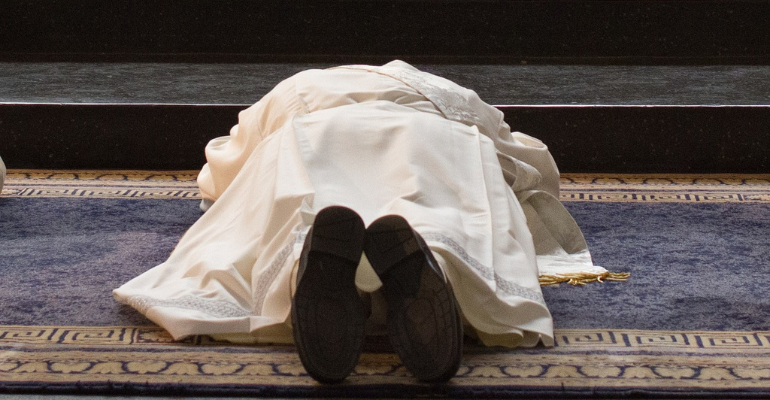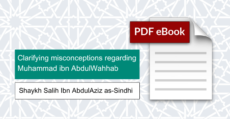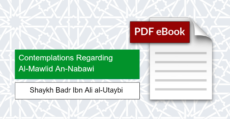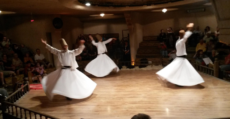In the name of Allāh, ar-Raḥmān (the most merciful), ar-Raḥīm (the bestower of mercy).
Sujūd (prostrating) is one of the greatest acts of worship because it symbolises utmost humility and submission. The Prophet ﷺ said,
The closest a worshipper is to his Lord is when he is in sujūd (i.e. prostrating)… [1]
Some, among the people of bid’ah, permit prostrating and bowing to a person if it is done out of respect or as a greeting. They claim that prostrations are two types:
- A prostration of worship: which is agreed by all that it can only be done for Allāh, if it is directed to other than him, it is kufr (disbelief).
- A prostration of respect and greeting: which they claim can be performed to any individual with the intention of respect and not worship.
The scholars of Ahl as-Sunnah have mentioned that prostrating to a person with the intention of worship is clear Kufr and Shirk. As for prostrating to a person as a mere greeting or out of respect, it is ḥarām (prohibited) and in certain situations, may lead to kufr..
The main evidence which is cited to justify the allowance of prostrating as a greeting is when the brothers of Prophet Yusuf (alayhi as-salaam) prostrated to him.
Clarifying the story of Prophet Yūsuf.
Allāh, the exalted, mentioned the story of Prophet Yūsuf (alayhi as-salaam). Towards the beginning of his life he had a dream in which he saw the sun and moon; and he saw 11 stars all prostrating to him.
This was mentioned in the saying of Allāh,
{When Yūsuf said to his father, “O my father, indeed I have seen [in a dream] eleven stars and the sun and the moon; I saw them prostrating to me” } [12:04]
The interpretation of this dream is that his eleven brothers – symbolised by eleven stars in his dream – would one day prostrate to him, as a sign of his eventual authority over them.
By the will of Allāh, this dream was became a reality. Unbeknown to his brothers, Prophet Yūsuf became the Minister of Finance; upon realisation, they recognised his authority and were ordered to prostrate to him.
Allāh mentions,
{He [Yūsuf] raised his parents upon the throne; and they [his eleven brothers] bowed to him in prostration. He said, “O my father, this is the explanation of my dream of before. My Lord has made it a reality.”} [12:100]
His brothers prostrating to him is used by some people to justify sujūd (prostration) to other people as long as it is not done with the intention of worship, this is then implemented by some among the “Sūfis” who prostrate to their shaykhs, pirrs and murshids (spiritual guides), claiming this is merely a form of respect.
In explaining the incident of the brothers of Prophet Yūsuf prostrating to him, Ibn Kathīr [d: 676h] said:
“This action [of prostrating out of respect] was permitted in their Sharī’ah (i.e. in the legislation at the time of Prophet Yūsuf), that upon greeting an elder they would prostrate to him. It remained permitted from the time of Adam to the legislation of ‘Īsa (alayhi as-salaam). However, it was then forbidden for this Sharī’ah (i.e. the legislation of Muḥammad ﷺ). Sujūd was restricted to to the Lord – glorified and most-high.
This is what the statement of Qatādah implies, and other [scholars] as well.
Also in the ḥadīth of Mu’ādh, when he returned back from Shām (Syria and the surrounding lands). He used to see the people there prostrating to their bishops, so when he returned to the Prophet ﷺ he prostrated to him.
The Prophet ﷺ remarked:
What is this O Mu’ādh?
He replied:
Verily, I saw the people of Shām prostrating to their bishops, and you are more deserving of being prostrated to, O Messenger of Allāh.
The Prophet ﷺ replied,
Do not do this…If I was to ever order a person to prostrate in front of another person I would have commanded the wife to prostrate to her husband due to the great right he has upon her. [2]
In the other ḥadīth, Salmān [al-Fārsi] met the Prophet ﷺ in one of the streets of Madīnah. At this stage, he was still new to Islām so he prostrated to the Prophet ﷺ.
So he replied,
Do not prostrate to me O Salmān, rather prostrate to the ever-living (i.e. Allāh) who never dies.
The point is, this action [of prostrating out of respect] was permitted in their legislations and therefore they (the brothers of Prophet Yūsuf) prostrated in front of him.” [3]
Statements of the scholars regarding prostrating out of respect.
al-Ḥāfiẓ an-Nawawi [d: 676h] said: “What many ignorant people do, in prostrating to their shaykhs, is absolutely ḥarām, in every situation, regardless of whether it is towards the Qiblah or another direction, regardless of whether he intended prostration for Allāh, or was negligent. And in certain situations, this action necessitates kufr (disbelief), or is close to it…” [4]
Al-Qurtubi [d: 671h] said: “This prostration is forbidden; the ignorant ones among the sūfiyyah have taken it as a custom during their singing, and when they go to their shaykhs, and in seeking forgiveness; one of them will be seen when he is overcome by this state – as claimed by him – he will prostrate to a person who approaches. And this is due to his ignorance – regardless of whether it is towards the Qiblah or another direction. Their efforts are misguided and their actions are lost.” [5]
Ibn Taymiyyah [d: 728h] said: “The texts of the Sunnah, as well as the Ijmā’ (consensus) of the Ummah show the impermissibility of prostrating to other than Allāh in our Sharī’ah, [regardless] of whether it is done as a greeting or worship, like the Prophet’s prohibition to Mu’ādh Ibn Jabal when he returned from Shām (Syria) and prostrated to him as a greeting.” [6]
Muḥammad Ibn Ibrāhīm āl ash-Shaykh [d: 1389h] said: “Bowing down during greeting is ḥarām if only a greeting is intended; and it is kufr (disbelief) if worship is intended.” [7]
Summary.
From the above, we can classify sujūd into two types:
- First type: When it is performed as a form of ‘ibādah, exaltation or seeking closeness: if done for other than Allāh it is kufr and shirk.
- Second type: When it is performed as a greeting or out of respect: This was permitted in previous legislations, however in our legislation, it is ḥarām , and a severe sin, and it can lead to kufr if exaltation enters into the heart.
Allāh knows best, may Allāh send salutations of praise and peace upon our Prophet, his family, companions and followers.
Written by the one in need of the mercy of Allāh,
Abul Abbaas Naveed Ayaaz,
11th Dhul Hijjah, a day after the blessed day of Eid Al-Adhaa, 1439h
Corresponding to 22nd August, 2018.
Nelson, Lancashire.
Footnotes
[1] Narrated by Abu Hurayrah; Collected by Muslim.
[2] Narrated by Ibn Abī Awfā; Collected by Ibn Maajah
[3] Tafsīr Ibn Kathīr of Sūrah Yūsuf, āyah 100
[4] Al-Majmū Vol 4 Page 69
[5] Tafsīr Al-Qurtubi Vol 1. Page 294
[6] Jāmi’ Al-Masāil Vol. 1 Page 25
[7] Fatāwa war-Rasāil Vol. 1 Page. 1





May Allah bless you akhiy!
BaarakaAllah Feek